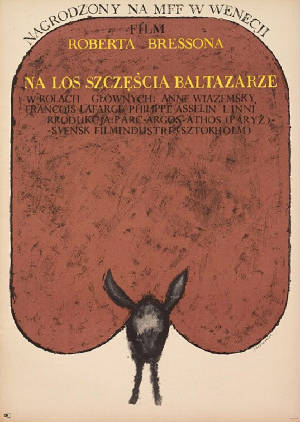|
|
 |
|

(1966, directed by Robert Bresson)
- inducted 2017 –
“Bresson is rightfully revered for taking great big abstractions like loss and transcendence and making fearless and
unflinching films about them. On the surface, Au hasard, Balthasar details the life and cruel death of a donkey in
rural France, yet also encompasses the suffering and descent into sexual nihilism of the donkey’s first owner Marie
(the haunting Anne Wiazemsky), the cruelty that one man can inflict, indiscriminately, on beast and woman and fellow man,
and the horrifyingly self-focused nature of humanity.
“Tragedy follows the beast throughout its short life, passing through a succession of cruel owners and bearing witness
to countless acts of humanity at its absolute worst. The emotional destruction and sexual humiliation of the girl Marie, the
social and legal demolishing of the girl’s father, whose own pride cannot allow him to remedy the ills of his situation,
and the vicious scheming of the boy Gerard (Francois Lafarge, who demonstrates that cruelty is a factory setting on the human
animal), who in addition to tormenting the donkey, debasing the girl Marie, and defrauding the friendly baker who has taken
him in, has decided to use Balthasar in a smuggling operation.
“No act of graciousness can yield anything good. No extending of the benefit of the doubt will help an individual right
themselves. Bresson’s vision gives no quarter. The dignity that he grants this tragic creature Balthasar is, sadly,
the one thing humanity can never truly have. Not here. Especially not now. Because to be able to articulate oneself, to analyze
and truly observe others, eliminates the possibility of graciousness. Balthasar’s lowly status is what allows him to
transcend the world; and for the viewer, there is only that realization. We may grant souls as children at play, through anthromorphization
and through cute videos on the Internet, but the gaze of a helpless creature who cannot understand why it is hurt, why it
is destroyed- that is the world looking back at us.”
~ Jason Shawhan
|
 |
|
Principal cast: Anne Wiazemsky, Walter Green, François Lafarge, Philippe Asselin, Nathalie Joyaut, Jean-Claude
Guilbert, Jean-Joel Barbier, François Sullerot, Marie-Claire Fremont, Jacques Sorbets, Jean Rémingard
Written by Robert Bresson
Produced by Mag Bodard
Director of photography Ghislain Cloquet
Production design by Pierre Charbonnier
Film editing by Raymond Lamy
Original music by Jean Wiener
Sound by Antoine Archimbaud, Jacques Carrère
Assistant director Claude Miller
Animal trainer Guy Renault
France
Duration: 95 minutes
Languages: French
Filmed in black and white
Sound mix: Mono
Cinematographic process: spherical
Aspect ratio: 1.66:1
Printed film format: 35mm
Produced by Argos Films, Athos Films, Parc Film, Svensk Filmindustri, Svenska Filminstitutet
Released in USA by Cinema Ventures
Premiered at the Cannes Film Festival on May 15, 1966
USA release date: February 19, 1970
Awards and honors:
- Selected as one of Roger Ebert’s “Great Movies,” March 19, 2004
- Venice Film Festival, 1966: Golden Lion (nominee)
|
 |
|
|
 |
|
|
 |
|
|
|
|
|
|
 |

